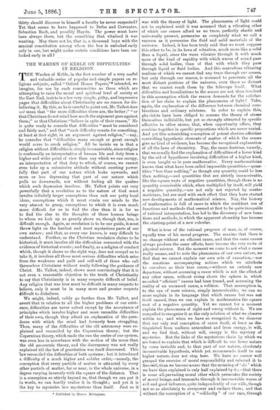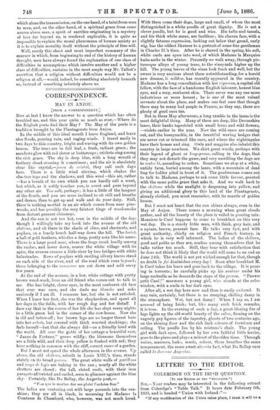THE WARDEN OF KEBLE ON DIFFICULTIES IN RELIGION.
THE Warden of Keble, in the first number of a very useful and valuable series of popular and simple papers on re- ligious subjects, called " Oxford House Papers,"* intended, we imagine, for use by such communities as those which are attempting to raise the moral and spiritual level of society at the East End, insists in a few very simple, pithy, and impressive pages that difficulties about Christianity are no reason for dis- believing it. By this, as he is careful to point out, Mr. Talbot does not mean that "the more difficulties there are, the better;" "or that Christians do not mind how much the argument goes against them;" or that Christians "believe in spite of their reason." He is quite ready to concede that difficulties " must be considered and fairly met," and that "each difficulty counts for something, at least at first sight, in an argument against religion,"—nay, he concedes that "difficulties many enough or great enough would serve to crush religion." All he insists on is that a religion without difficulties is simply inconceivable, since religion is confessedly an interpretation of human life and duty from a higher and wider point of view than any which we can occupy, an interpretation of that duty to which, of course, we cannot even take up a submissive attitude without exerting power- fully that part of our nature which looks upwards, and more or less depressing that part of our nature which pulls us downwards, nor without feeling all the qualms which such depression invokes. Mr. Talbot points out very powerfully that a revelation as to the nature of God must involve infinitely larger conceptions than suit our petty local ideas, conceptions which it must strain our minds to the very utmost to grasp, conceptions to which it is even much more difficult for us to find the clue than it is for us to find the clue to the thoughts of those human beings to whom we look up as greatly above us, though that, too, is difficult enough. Again, as revelation is to be our guide, it must throw light on the hardest and most mysterious parts of our own nature ; and that, as every one knows, is very difficult to understand. Further, as the Christian revelation claims to be historical, it must involve all the difficulties connected with the evidence of historical events ; and finally, as a religion of conduct which, though it shows us the right way, does not compel us to take it, it involves all those most serious difficulties which arise from the weakness and guilt and self-will of those who call themselves Christians without really following the guidance of Christ. Mr. Talbot, indeed, shows most convincingly that it is not even a reasonable objection to the truth of Christianity to say that Christianity is in many respects difficult of belief. Any religion that was true must be difficult in many respects to believe, only it must be in many more and greater respects difficult to disbelieve.
We might, indeed, safely go farther than Mr. Talbot, and assert that in relation to all the higher problems of our exist- ence, difficulties are never solved except by the acceptance of principles which involve higher and more recondite difficulties of their own, though they afford an explanation of the para- doxes with which the mind had formerly been struggling. Thus, many of the difficulties of the old astronomy were ex- plained and reconciled by the Copernican theory ; but the Copernican theory, which made the sun the centre of our system, was even less in accordance with the motion of the moon than the old geocentric theory, and the discrepancy was not really explained till the law of gravitation was itself discovered. This law reconciled the difficulties of both systems; but it introduced a difficulty of a much higher and subtler order,—namely, the conception that every particle of matter is attracted by every other particle of matter, far or near, in the whole universe, in a degree varying inversely with the square of the distance. That is a conception so utterly beyond us, that though we can put it in words, we can hardly realise it in thought ; and yet it is the key to mysteries less mysterious than itself. Just so it
.• Published by Messrs Riviugtonr.
was with the theory of light. The phenomena of light could not be explained until it was assumed that a vibrating ether of which our senses afford us no trace, perfectly elastic and universally present, permeates as completely what we call a vacuum as it permeates the fluid and solid materials of the universe. Indeed, it has been truly said that we must suppose this ether to be, in its laws of vibration, much more like a solid than a liquid, since the wave vibrates through it with much more of the kind of rapidity with which waves of sound pass through solid bodies, than of that with which they pass through liquid or fluid bodies. And this marvellous vibrating medium of which we cannot find any trace through our senses, but only through our reason, is assumed to penetrate all the most distant portions of the universe, even those so distant that we cannot reach them by the telescope itself. What difficulties and humiliations to the senses arc not then involved in this assumption which the reason demands for the satisfac- tion of her claim to explain the phenomena of light! Take, again, the explanation of the difference between chemical com- binations and ordinary mixtures. In order to explain this, physicists have been obliged to assume the theory of atoms themselves indivisible, but yet so strongly attracted by specific affinities to other atoms, that, when opportunity offers, they combine together in specific proportions which are never varied. And yet this astonishing conception of potent elective affinities controlling hypothetic elements of matter of which the senses give no kind of evidence, has become the recognised explanation of all the laws of chemistry. Nay, the same doctrine, namely, that we usually find the explanation of difficulties of a lower kind by the aid of hypotheses involving difficulties of a higher kind, is even taught us in pure mathematics. Every mathematician knows that what have been called impossible quantities,—quan- tities " less than nothing," as though any quantity could be less than nothing,—and quantities that are strictly inconceivable, like the square roots of negative quantities, though there is no quantity conceivable which, when multiplied by itself, will yield a negative quantity,—are not only not rejected by mathe- maticians, but are used with such effect that they have started new developments of mathematical science. Nay, the history of mathematics is full of cases in which the confident use of functions and methods that seemed at first to be quite incapable of rational interpretation, has led to the discovery of new func- tions and methods, in which the apparent absurdity has become the starting-point of a new calculus.
What is true of the rational progress of man, is, of course, equally true of his moral progress. The maxims that there is no change without an efficient cause, and that the same causes always produce the same effects, have become the very roots of physical science. But the moment we come to ask what a cause really means, and to note the phenomena of our own nature, we find that we cannot explain our own acts of causation,—nor the emotions accompanying actions which we attribute to ourselves as their true cause,—without an entirely new departure, without assuming a cause which is• not the effect,of any other cause, without rising above the sphere in which so-called " efficient " causes had been traoed, and assuming the reality of an uncaused cause, a volition. That assumption is to the eye of mere science, simply inconceivable ; we can no more explain in its language that which causes but was not itself caused, than we can explain in mathematics the square root of a negative quantity. Yet we cannot for a moment explain the phenomena of right and wrong without it. We are compelled to recognise it as the only solution of what we observe within us ; and when we have so recognised it, we discover that our only real conception of cause itself, at least as dis- tinguished from uniform antecedent and from energy, is will, and we find that, without will, energy is the mystery of mysteries. But the links of the mysterious chain by which we are forced to explain that which is difficult to our lower nature by some invisible and, to that part of our nature, absolutely inconceivable hypothesis, which yet recommends itself to our higher nature, does not stop here. We have no sooner well grasped the exercise of moral responsibility and referred it to free-will, than we become aware that the meaning of sin' which we have thus explained is only half explained by it;-,that there is some all-pervading moral ether which permeates the society of moral beings, and transmits through it innumerable waves of evil and good influence, quite independently of our wills, though not so as absolutely to overpower and enslave them; and that without the conception of a " solidarity " of our race, through
which alone the transmission, on the one hand, of a taint from man to man, and, on the other hand, of a spiritual grace from some source above man, a spirit of sacrifice originating in a mystery of love far beyond us, is rendered explicable, it is quite as impossible to explain the moral phenomena of human society as it is to explain morality itself without the principle of free-will.
Well, surely this short and most imperfect summary of the manner in which, from beginning to end of the history of human thought, men have always found the explanation of one class of difficulties in assumptions which involve another and a higher class of difficulties, sustains in the most ample way Mr. Talbot's assertion that a religion without difficulties would not be a religion at all,—would, indeed, be something absolutely beneath us, instead of something infinitely above us.



































 Previous page
Previous page